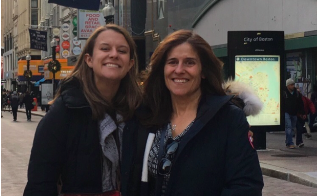The Value of Researcher-Practitioner Conversations
I was thrilled to see that the Chronicle had posted an announcement about the 2015 Summer Institute on Youth Mentoring this week. We are really excited at MENTOR to be partnering with Portland State University and Dr. Tom Keller in putting on this event, which will focus this year on research and best practices for monitoring and supporting matches. This is such a critical component of mentoring: It’s the task where programs troubleshoot problems between the mentor and mentee, give advice that can strengthen the relationship, and ensure that the work of mentors has fidelity to the overall program model and theory of change. In many ways, the practices around monitoring and support make or break program outcomes.
I know I’m really looking forward to hearing the new research and innovative theories that will be presented at this event (by some of the leading researchers we have in this field). But I’m equally excited to hear what program participants have to say about the topic. I want to hear their successful strategies, their challenges, the tools they need to do this better, and where they think new research could help.
It’s these types of conversations, where researchers and practitioners can engage in open and honest dialogue, that are so valuable to the mentoring movement. I’ve had the good fortune to attend each of these Summer Institutes and there really is nothing else like it in mentoring. It’s a week of new research, of new thinking, of new conversations about how to improve the mentoring experience and enhance the value of mentoring for young people. The conversations from these events typically fall into a couple of meaningful categories:
- Researchers presenting data and information from their work that challenges the conventional wisdom of typical program practice. In some cases, program staff embrace this new information; in others they push back or struggle with how exactly to use the information in improving their work (so we figure it out together).
- Researchers presenting data and information that spurs innovation. Every one of these events ends with program representatives eager to go home and implement a new strategy, a new curriculum, or a new technique that they think can improve their services. It’s a real idea factory…
- Practitioners urging the research community to go in new directions or emphasize research that is relevant to current practitioner needs. It is so valuable for the researchers to hear this kind of direct feedback. They all want to be doing work that is meaningful to those working in programs, that boosts the outcomes for children and families. These kinds of direct conversations sharpen the focus of future research and I know that many a new research project has had its genesis at the Summer Institute.
MENTOR is celebrating its 25th anniversary as an organization this year and as I think back on this quarter century I’m really struck by just how sophisticated the mentoring field has become. We have done a good job of learning about mentoring relationships, and how programs best facilitate them, and turning that into continuous improvement of our collective work. But there is still so much more to learn; there always will be. But what’s important is that the research and program sides of this field work in unison. Programs need to be researching their innovations and operations so we can scale best practices and improve program quality across the board. Researchers need to ensure that their work is useful and practical. And both of those groups must work together so that policymakers and funders have the information they need to invest in mentoring in smart and impactful ways.
So I encourage you to participate in these researcher-practitioner conversations whenever and wherever you can. If you are interested in attending the SIYM, you can learn more here. But even if you can’t get to Portland this summer, try to have these conversations in other spaces: In the comment sections of this site, at your own conferences, with researchers and academics in your communities. It’s those conversations that have allowed the mentoring movement to get where it is today. And if we can keep learning, improving, sharing, and talking, we will only improve the results for children.
So don’t be shy – find a researcher and tell’em what you think!











